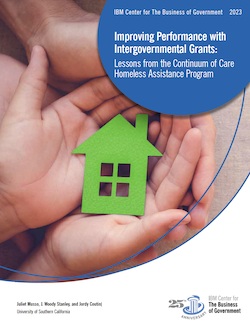
Improving Performance of Federal Grant Programs - Lessons From a HUD Program Case Study

Federal spending on mandatory and discretionary grant programs reached a new high in Fiscal Year 2022. Interest in the effectiveness of these intergovernmental partnerships is of increasing importance to policymakers, government agency managers, and citizens.
Among the nation’s current challenges for such partnerships is the goal to make homelessness among individuals and families a rare, brief, and non-recurring experience. Department of Housing and Urban Development (HUD) homeless assistance grants provide a cornerstone of federal efforts to achieve this outcome. In administering this system, HUD has implemented a system of performance measurement and reporting, an example of how a federal agency and local community grantees can implement performance-based management practices to improve outcomes.
How best to improve grant program performance based on a comprehensive case study with HUD’s assistance programs is the subject of a new report for the IBM Center, Improving Performance with Intergovernmental Grants: Lessons from the Continuum of Care Homeless Assistance Program, by Juliet Musso, J. Woody Stanley, and Jordy Coutin with the University of Southern California.
This report illuminates how to improve data sharing and performance management in intergovernmental programs. The authors share findings from HUD’s Continuum of Care (CoC) program that inform an in-depth examination of the federal government’s largest discretionary grant program intended to reduce homelessness. The research identifies HUD’s multi-pronged strategies that combine performance measures and capacity building supports to focus grant recipients on achieving national goals. These strategies provide a menu of smart practices that can be used by other federal agencies that administer intergovernmental grants.
The study concludes with a number of recommendations for HUD, and general considerations for grant programs. The study suggests the following strategies for HUD, including:
- Consider extending the competitive cycle’s time frame.
- Provide CoCs with more feedback to improve program implementation.
- While ensuring consistent reporting of system performance measures, allow CoCs to report additional measures and provide context for changes in outcomes based on local experiences and constraints.
- Encourage CoCs to explore integrated regional, statewide, or multistate approaches to homeless management information systems.
- Evaluate the efficacy of technical assistance and determine the need (and costs) for additional support funding.
The study findings also suggest value from examining some 30 similar discretionary grant programs that target homelessness in agencies with goals of improving the delivery of social services to local communities. This set of agencies could be a focus of future efforts to reduce administrative costs and enhance the effectiveness of intergovernmental performance requirements in federal programs.
In addition to providing specific recommendations for HUD, the report highlights several strategic themes where federal agencies administering similar discretionary programs more generally can give more support to improve grantee performance. These general strategies for supporting grantees include:
- Extending the competitive cycle and enhancing interactions with grantees
- Revising performance management reporting systems in consultation with grantees
- Assessing the impact of technical assistance and capacity support
- Expanding operational and regulatory flexibility



